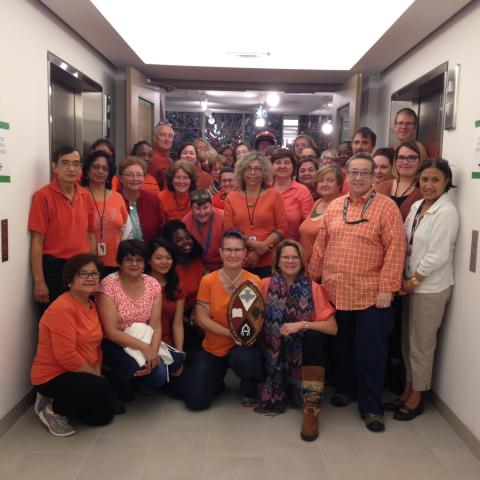Everyone is invited to wear an orange shirt to remember and honour all the Indigenous children who went to Residential School and those children who died at school.

Orange Shirt Day is an invitation to everyone to wear an orange shirt to show their compassion for the survivors of the Indian Residential Schools and to say that all children matter. Orange Shirt Day began with Phyllis (Jack) Webstad’s story, a Northern Secwpemc (Shuswap) woman from the Stswecem’c Xgat’tem First Nation who went to St. Joseph Mission Residential School. On her first day of school, Phyllis’s grandmother dressed her in an orange shirt. When Phyllis entered the school, she was stripped of her orange shirt and she wasn’t able to go home for a very long time – over 300 sleeps by her count. As a child, Phyllis cried herself to sleep every night along with other children who could not go home. No one listened to their pain or showed compassion.
As I write this, I think about my mother who went to Residential School with her brothers and sisters. Did they cry themselves to sleep as well? To this day, I do not know because they have a difficult time talking about what happened to them. While growing up, I did not understand my mother’s coldness or lack of affection. In my child’s mind, I blamed myself, thinking I did something wrong. As an adult, I learned about the Indian Residential School system and I realized this is what happened to my relatives. Until then, I harbored a deep resentment towards some of my family for what I thought were failures in their life. I wondered why I had to be born in a family with alcoholism or family violence. Although I blamed them for everything, I never understood that I was witnessing the aftermath of trauma, suffering, and cultural genocide. At that time, no one taught about Residential Schools and help was never available. We all carried that shame for many years.
After the initial shock of my realization, I began to cry. I grieved the loss of their childhood and I grieved the loss of the family I could have known. The Indian Residential School system was an education policy by the federal government “to kill the Indian” in Native children. In listening to other survivors, I know that in order to survive Residential School, you had to be tough and you had to be brilliant. I see evidence of this in my family’s ability to still speak the Omushkego Cree language, to hunt and trap, to be highly artistic and to tell funny stories. Despite the hardship my mother endured, she became a teacher and works hard every day to help children as she encourages them to get an education. Even though my mother still struggles at times in dealing with her emotions, I feel the warmth of her love. I know it is the strength of Creator, her spirit and her character that drives her to be the beautiful person she is today.
This year, September 30 falls on a Sunday. I invite everyone to wear an orange shirt to remember and honour all the Indigenous children who went to Residential School, and those children who died at school. Let us pray for the Residential School survivors who are still struggling. Let us pray for all the intergenerational survivors dealing with the trauma that was passed on due to lack of culturally appropriate healing services and programs. The Residential School policy was only one colonial policy; there are many others that exist today that continue to seek to kill the Indian. Let us become educated and work together to shine a light on injustice. On Orange Shirt Day, come filled with compassion and the spirit of truth and reconciliation.
— Honarine Scott is Omushkego Cree from Fort Albany First Nation and she is the Healing Programs Coordinator in the Indigenous Ministries Circle.
For more information on Residential Schools and reconciliation, read the Truth and Reconciliation Commission Calls to Action.
Join us by taking a picture of your congregation in orange shirts and upload the picture online using the following hashtags: #OrangeShirtDay #EveryChildMatters and #UCCan